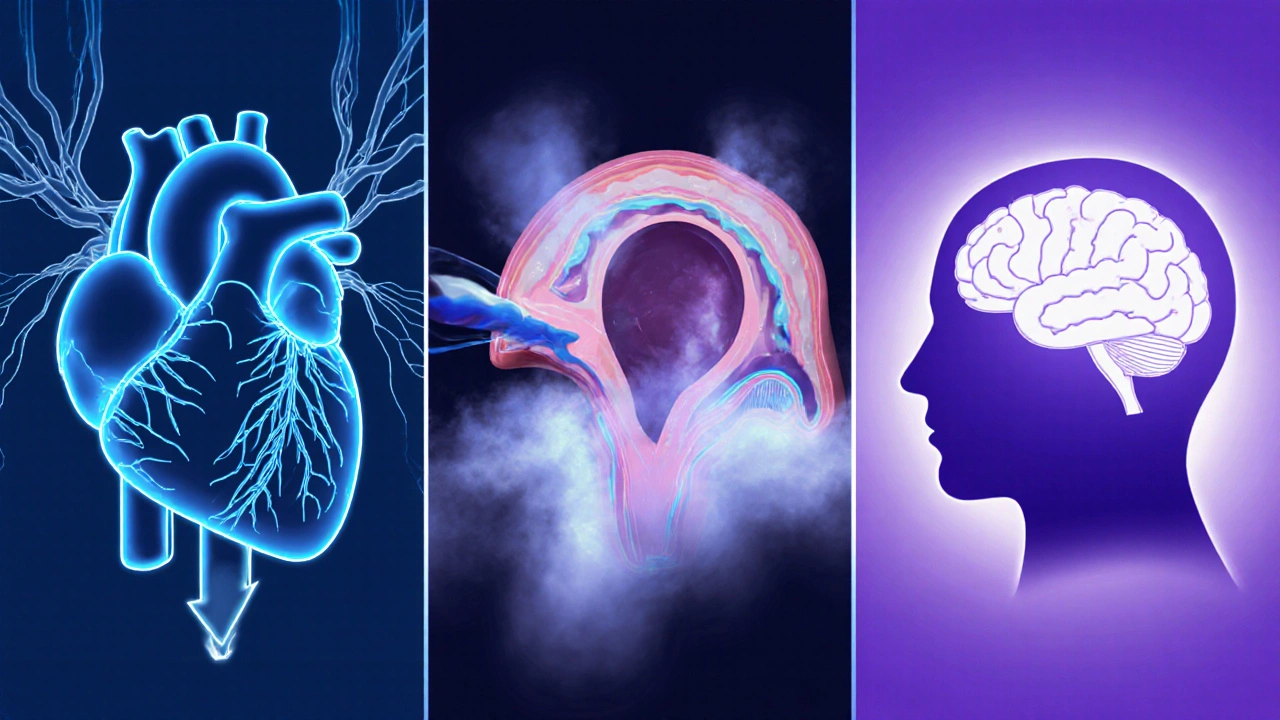Medication Dizziness Risk Checker
Enter medication names above and click "Check Dizziness Risk" to see potential risks.
Ever taken a pill and suddenly felt the room spin? That unsettling feeling isn’t always a coincidence-many medicines can tip your balance. Understanding which drugs are behind the wobble, why they do it, and what steps you can take can turn a frustrating episode into a manageable part of your health routine.
Key Takeaways
- Several drug classes-including antihistamines, blood pressure meds, and opioids-are known to trigger dizziness.
- The sensation can stem from blood pressure drops, inner‑ear interference, or direct effects on the brain.
- Older adults, people on multiple drugs, and those with existing balance issues are most vulnerable.
- Simple changes-like staying hydrated, standing up slowly, and reviewing dosages with a clinician-often reduce the risk.
- Seek immediate medical help if dizziness comes with chest pain, severe headache, or sudden vision loss.
Dizziness is a sensation of lightheadedness, unsteadiness, or the feeling that you or your surroundings are moving. It can range from a brief flutter to a full‑blown vertigo attack, and its causes span everything from dehydration to inner‑ear infections. In the context of medication, dizziness often signals that a drug is influencing blood flow, the nervous system, or the balance organs.
How Medications Trigger Dizziness
Most medicines affect the body in predictable ways, but a few hit the systems that keep you upright. The three main mechanisms are:
- Blood pressure fluctuations: Some drugs lower blood pressure too quickly, especially when you move from sitting to standing, leading to orthostatic dizziness.
- Inner‑ear disruption: Medications that alter fluid balance or affect the vestibular nerve can confuse the brain’s balance center.
- Central nervous system (CNS) depression: Sedatives, opioids, and certain antidepressants slow brain activity, causing a feeling of lightheadedness.
Knowing which pathway is at work helps you and your doctor pinpoint the culprit and adjust the treatment plan.
Common Medication Classes Linked to Dizziness
Below are the most frequently cited drug groups, each introduced with a microdata definition so search engines can easily recognize them.
Antihistamines are drugs that block histamine receptors to relieve allergy symptoms. Common over‑the‑counter options like diphenhydramine (Benadryl) and cetirizine (Zyrtec) can cause drowsiness and a sense of imbalance, especially at higher doses.
Selective serotonin reuptake inhibitors (SSRIs) such as fluoxetine (Prozac) and sertraline (Zoloft) boost serotonin levels to treat depression and anxiety. About 10‑15% of users report dizziness as a side effect during the first few weeks.
Beta‑blockers like propranolol and atenolol reduce heart rate and blood pressure. They’re great for hypertension and heart rhythm issues, but the sudden drop in blood pressure when standing can leave you feeling light‑headed.
Opioids (e.g., morphine, oxycodone) bind to pain‑relief receptors in the brain. Their sedating effect often includes dizziness, especially when combined with other CNS depressants.
Benzodiazepines such as diazepam (Valium) and lorazepam (Ativan) calm the nervous system. While effective for anxiety and seizures, they can also impair coordination and cause a woozy feeling.
Diuretics like furosemide (Lasix) and hydrochlorothiazide increase urine output to lower fluid overload. Rapid fluid loss can lower blood volume, leading to orthostatic dizziness.
Anticholinergics (e.g., scopolamine, trihexyphenidyl) block acetylcholine to treat motion sickness or Parkinson’s disease. They can interfere with inner‑ear signaling, resulting in imbalance.

Quick Comparison of Dizziness‑Inducing Drug Classes
| Drug Class | Typical Examples | Primary Mechanism | Risk Level (Low / Moderate / High) |
|---|---|---|---|
| Antihistamines | Diphenhydramine, Cetirizine | CNS depression, anticholinergic effect | Moderate |
| SSRIs | Fluoxetine, Sertraline | Serotonin modulation | Low‑to‑Moderate |
| Beta‑blockers | Propranolol, Atenolol | Blood pressure drop | Low‑to‑Moderate |
| Opioids | Morphine, Oxycodone | CNS depression | High |
| Benzodiazepines | Diazepam, Lorazepam | CNS depression | High |
| Diuretics | Furosemide, Hydrochlorothiazide | Volume depletion | Moderate |
| Anticholinergics | Scopolamine, Trihexyphenidyl | Inner‑ear interference | Moderate |
Who Is Most Susceptible?
Risk isn’t randomly distributed. Certain groups notice dizziness more often:
- Older adults: Age‑related changes in blood pressure regulation and balance make them a prime audience for side‑effects.
- People on multiple drugs (polypharmacy): Interactions can amplify dizziness, especially when combining CNS depressants.
- Individuals with pre‑existing conditions: Diabetes, hypertension, migraine, or inner‑ear disorders increase vulnerability.
- Those who skip meals or are dehydrated: Low blood sugar or fluid levels magnify medication‑induced drops in pressure.
Recognizing your personal risk factors empowers you to have a focused conversation with a prescriber.
Practical Ways to Manage Medication‑Related Dizziness
- Stay hydrated: Aim for at least 1.5‑2 liters of water daily, unless fluid restriction is medically advised.
- Rise slowly: When getting up from bed or a chair, pause for a few seconds, then stand gradually.
- Take meds with food: Many drugs, especially antihistamines and certain blood pressure pills, cause less dizziness on a full stomach.
- Review timing: Spacing doses (e.g., taking a diuretic in the morning rather than evening) can reduce nighttime dizziness.
- Limit alcohol and sedatives: Combining alcohol with CNS depressants magnifies the light‑headed feeling.
- Ask about alternatives: A switch from a first‑generation antihistamine to a second‑generation one often lessens drowsiness and dizziness.
These tweaks don’t replace professional advice, but they’re low‑effort steps you can start today.

When to Seek Immediate Medical Attention
Dizziness is usually harmless, yet some scenarios demand urgent care:
- Sudden severe headache or visual changes.
- Chest pain, shortness of breath, or palpitations.
- Loss of consciousness or near‑fainting.
- Persistent vertigo lasting more than a week despite adjustments.
If any of these signs appear, call emergency services or head to the nearest accident‑and‑emergency department.
Talking to Your Healthcare Provider
Open communication is key. Bring a written list that includes:
- All prescription medicines, over‑the‑counter drugs, and herbal supplements.
- When the dizziness started and how often it occurs.
- Any patterns you notice-like after meals, when standing, or after a specific dose.
Ask direct questions: “Could this drug be making me dizzy?” or “Is there a lower‑dose or alternative that has fewer balance side effects?” Your clinician may suggest a dose taper, a different class, or a simple lab test to rule out other causes.
Bottom Line
Medication‑induced dizziness isn’t a mystery-it’s a predictable side‑effect when drugs touch blood pressure, the inner ear, or the brain’s alertness centers. By recognizing the culprits, understanding your personal risk, and taking proactive steps, you can keep the world steady while still benefiting from the treatments you need.
Frequently Asked Questions
Can over‑the‑counter allergy pills make me dizzy?
Yes. First‑generation antihistamines like diphenhydramine are known for causing drowsiness and a sense of imbalance. Switching to a second‑generation option such as cetirizine often reduces these effects.
Why do blood pressure medicines cause light‑headedness?
These drugs lower blood pressure to protect the heart. If the drop happens quickly-especially when you stand up-the brain receives less blood, triggering orthostatic dizziness.
Is it safe to stop a medication that makes me dizzy?
Never stop a prescription abruptly without medical guidance. Discuss the symptom with your doctor; they may taper the dose, switch drugs, or add a supportive medication.
Do diuretics cause dehydration‑related dizziness?
Yes. Diuretics increase fluid loss, which can lower blood volume and pressure. Drinking adequate water and taking the pill earlier in the day can help.
What should I do if I feel dizzy after starting a new medication?
First, sit or lie down to avoid falls. Note the timing and any other symptoms, then contact your prescriber within 24‑48hours for advice.


I am a pharmaceutical expert with over 20 years of experience in the industry. I am passionate about bringing awareness and education on the importance of medications and supplements in managing diseases. In my spare time, I love to write and share insights about the latest advancements and trends in pharmaceuticals. My goal is to make complex medical information accessible to everyone.